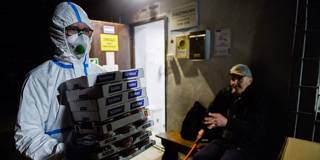Governments must use the momentum created by the COVID-19 pandemic to make rapid progress toward collectively financed, comprehensive, and permanent social-protection systems. Only then will our societies and economies be able to weather the current crisis – and those to come.
NEW YORK – If the COVID-19 pandemic has sent the world one message, it is that we are only as safe as the most vulnerable among us. Those who are unable to quarantine themselves or to get treatment endanger their own lives and the lives of others, and if one country cannot contain the virus, others are bound to be infected, or even re-infected. And yet, around the world, social-protection systems are failing miserably at safeguarding the lives and livelihoods of vulnerable groups.
Nearly 40% of the world’s population has no health insurance or access to national health services. Some 800 million people spend at least 10% of their household budget on health care each year, and 100 million people fall into poverty because of medical expenses. This means that many simply lack the means to seek treatment when they are sick – including when they have highly contagious diseases like COVID-19.
Compounding the problem, an overwhelming majority of workers lack the economic security to take sick leave or cope with an unexpected emergency. Because fewer than two-thirds of countries have a social insurance and/or social assistance scheme in place to provide sickness benefits, the ill are often forced to choose between endangering personal and public health and paying their bills.

NEW YORK – If the COVID-19 pandemic has sent the world one message, it is that we are only as safe as the most vulnerable among us. Those who are unable to quarantine themselves or to get treatment endanger their own lives and the lives of others, and if one country cannot contain the virus, others are bound to be infected, or even re-infected. And yet, around the world, social-protection systems are failing miserably at safeguarding the lives and livelihoods of vulnerable groups.
Nearly 40% of the world’s population has no health insurance or access to national health services. Some 800 million people spend at least 10% of their household budget on health care each year, and 100 million people fall into poverty because of medical expenses. This means that many simply lack the means to seek treatment when they are sick – including when they have highly contagious diseases like COVID-19.
Compounding the problem, an overwhelming majority of workers lack the economic security to take sick leave or cope with an unexpected emergency. Because fewer than two-thirds of countries have a social insurance and/or social assistance scheme in place to provide sickness benefits, the ill are often forced to choose between endangering personal and public health and paying their bills.